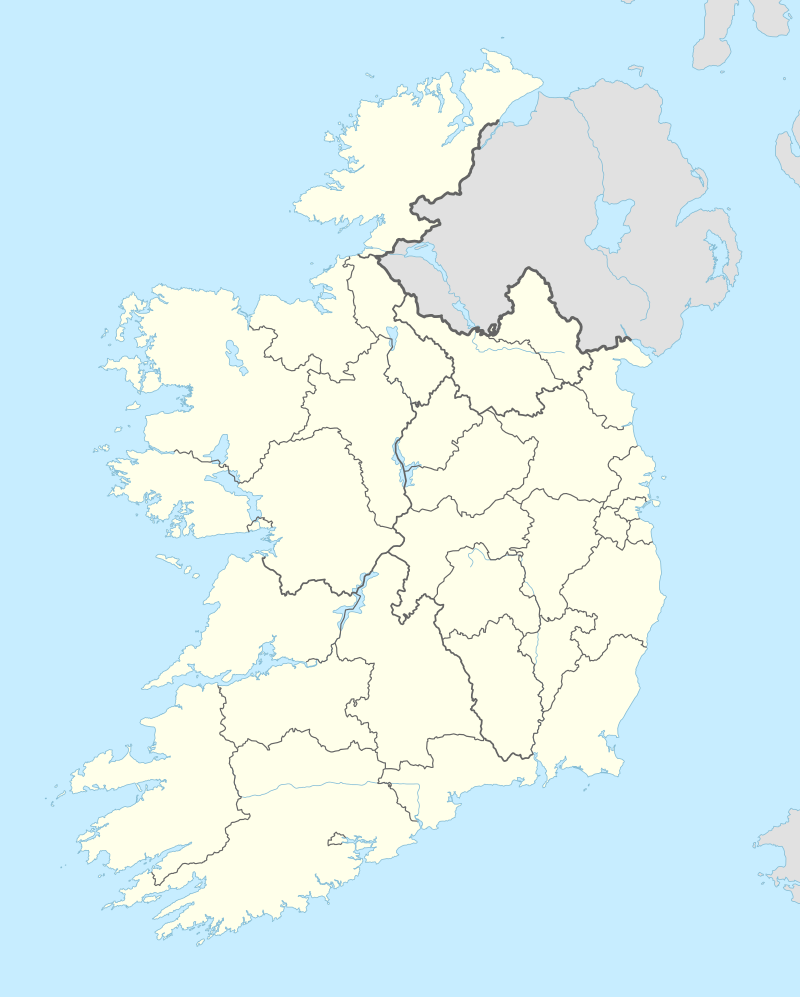Kilfintinan
| Kilfintinan Cill Fhiontanáin | |
|---|---|
| Town | |
 Kilfintinan | |
| Coordinates: 52°41′55″N 8°45′47″W / 52.698598°N 8.762973°WCoordinates: 52°41′55″N 8°45′47″W / 52.698598°N 8.762973°W | |
| Country | Ireland |
| Province | Munster |
| County | County Clare |
| Time zone | WET (UTC+0) |
| • Summer (DST) | IST (WEST) (UTC-1) |
Kilfintinan (Irish: Cill Fhiontanáin[1]) is a civil parish in County Clare, Ireland. It is part of the Catholic parish of Cratloe.
Name
The name Cill Fintinan would mean "Church of Fintinan", but there is no known Irish Saint Fintinan. The name is therefore thought to come from Cill Fionn tSeanain, or "Church of the fair Senan".[2]
Location
The parish is in the barony of Bunratty Lower, and contains a small part of the town of Sixmilebridge. It contains the village of Cratloe. It extends south from this town to the River Shannon.[3] The parish includes two small islands of Grass and Graigue in the Shannon.[4] The road from Limerick to Ennis crosses the north of the parish. It is 3 by 1.75 miles (4.83 by 2.82 km) and covers 6,115 acres (2,475 ha).[3]
Antiquities and history
The old church of Kilfintinan in the townland of Ballybrohan was almost entirely demolished by 1897. The church of Cruachán in the townland of Brickhill was in reasonably good condition. It was large, and surrounded by a large graveyard. There was another graveyard called Cill-an-bothair in the Ballyliddane townland, but no trace of a church.[5]
An old cromlech in very good condition stood near the Cruachán ruins. There was another nearby, but it had been demolished. On the hill called the Leacht, near the cromlechs, there was the grave of an unknown Irish chieftain from pre-Christian times.[5] As of 1837 the ruins of the castles of Cratloe, Cratloe Kail, and Ballintlea were still visible.[4] The Ballintea castle is not found in the 1580 list of castles.[5]
In the mid-18th century there was a shortage of Catholic priests in the region. The parish of Kilfintinan was therefore merged with part of the parish of Killeely, forming what is now known as the parish of Cratloe after the village of that name.[2] The population in 1841 was 2,633 in 424 houses. At that time there were two Catholic chapels.[3]
Townlands
The parish holds the townlands of Ballinphunta, Ballintlea North, Ballintlea South, Ballybroughan, Ballyliddan East, Ballyliddan West, Ballymorris, Ballyroe, Brickhill East, Brickhill West, Calluragh, Cappanalaght, Carrowmore, Carrownerribul, Castlequarter, Cratloe, Fortwilliam, Gallowshill, Garryncurra, Gortnanool, Heathmount, Island, Knockroe, Laghile, Mountievers, Moyhill and Portdrine.[6]
References
Citations
Sources
- "Cill Fhiontanáin". Placenames Database of Ireland. Retrieved 2014-04-10.
- Frost, James (1897). "Ui Ainmire, Kilfintinan Parish". The History and Topography of the County of Clare. Retrieved 2014-04-06.
- "History of Cratloe Parish". Cratloe Parish. Retrieved 2014-04-06.
- Lewis, Samuel (1837). "Kilfentinan". County Clare: A History and Topography. Retrieved 2014-04-06.
- "Map of Kilfintinan Parish showing Townlands". Clare County Library. Retrieved 2014-04-06.
- Kilfintinan, or Kilfentinan. Parliamentary Gazeteer of Ireland. 1845. Retrieved 2014-04-06.